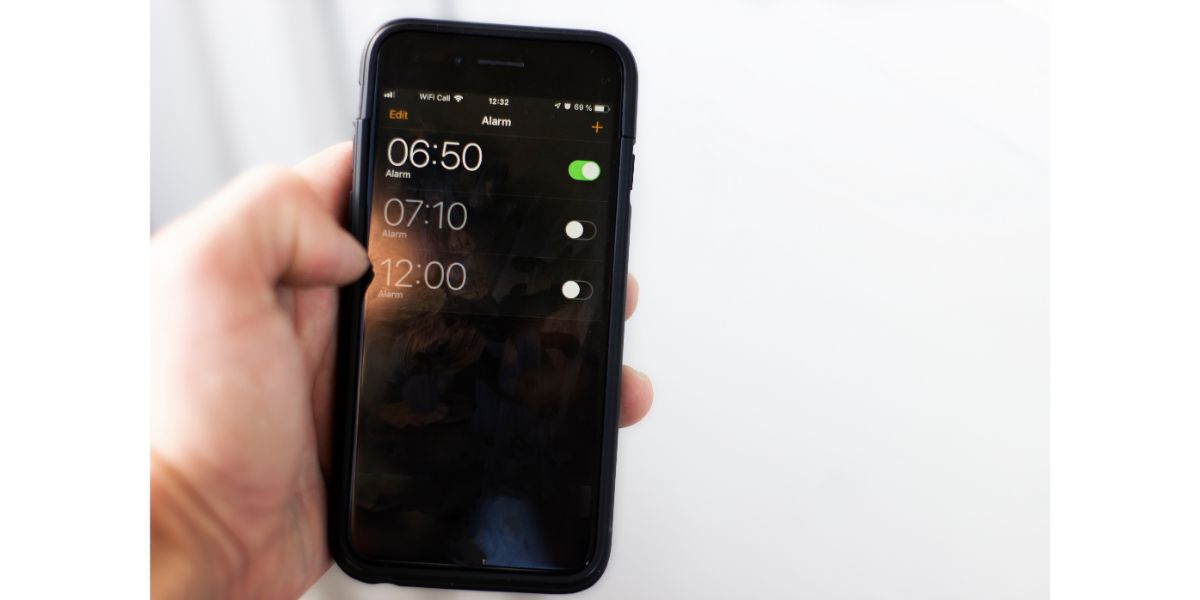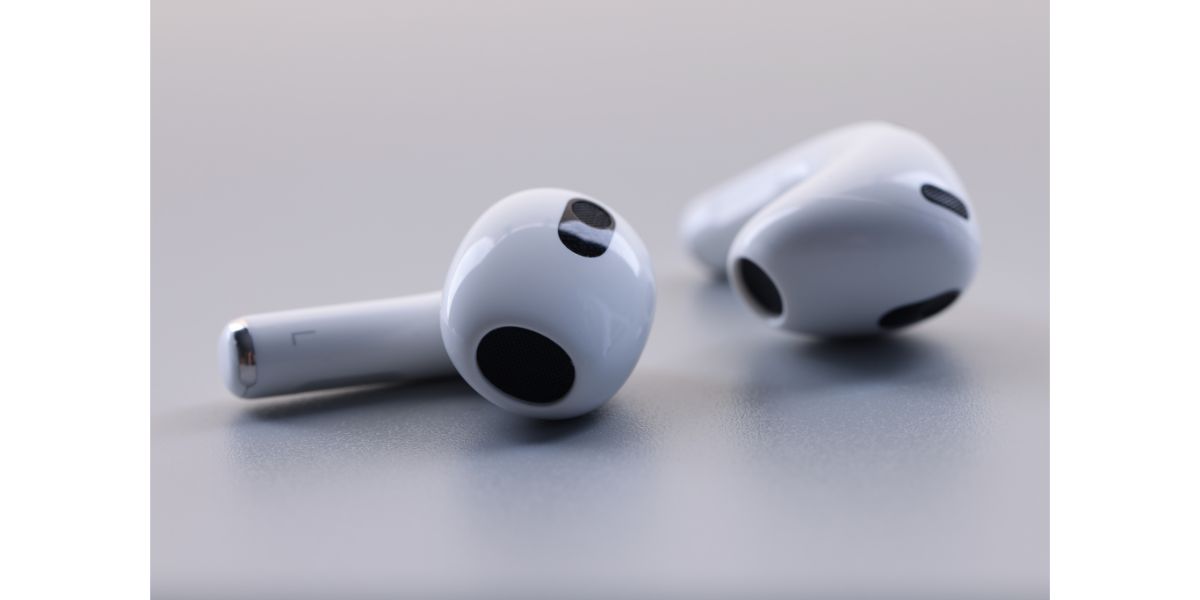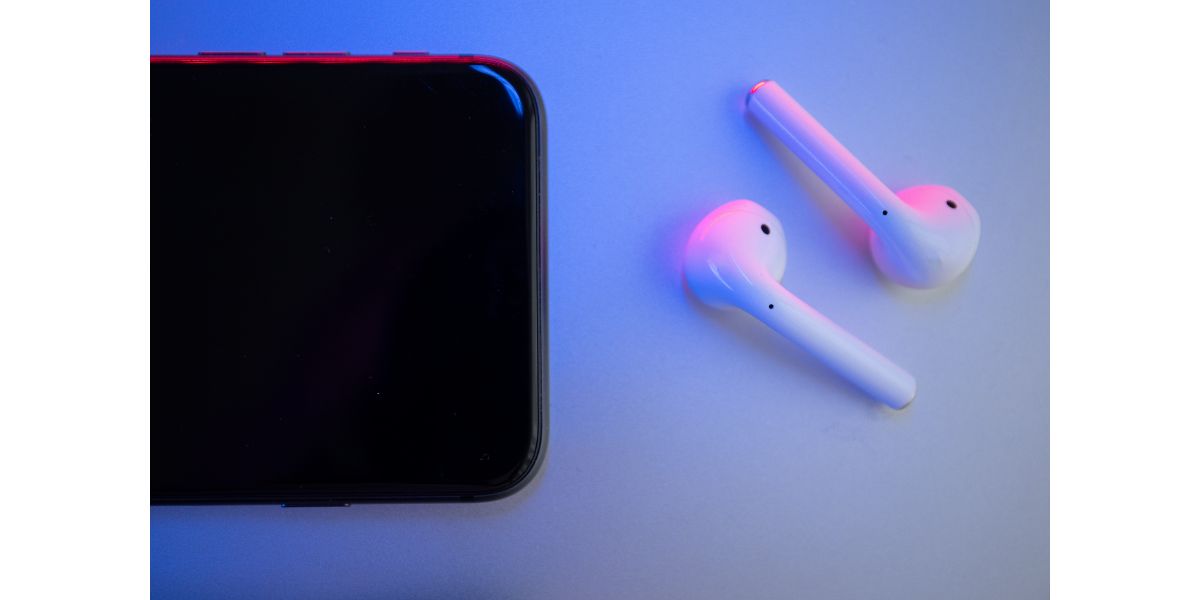Disclaimer: This post may contain affiliate links, meaning we get a small commission if you make a purchase through our links, at no cost to you. For more information, please visit our Disclaimer Page.
Since the evolution of Bluetooth and the emergence of Bluetooth headphones such as Airpods, the audio capabilities of devices have been transformed exponentially.
Airpods can play all sounds, including music, your favorite podcast, phones, and even alarms. In this article, we’ll dive into how Apple devices enable alarms to be played through Airpods.
Table of Contents
Do Alarms Play Through AirPods?
Alarms do play through Airpods, but only if you’re running on IOS 12 and higher. For IOS 12 versions, the alarm will sound off in the Airpods, and the iPhone will only vibrate. For older versions, it will go off in both your Airpods and the device’s internal speakers automatically.
If you have an older IOS and want to have all your alarms go off in only your Airpods, then you’ll have to download a third-party application like Earphone alarm. With new IOS systems, there isn’t a provision to opt for alarm ringing via speakers when you have Airpods on.
This has raised concerns from users who don’t understand Apple’s decision to disable the option to only hear your Alarm in Airpods or on both Airpods and speakers. However, the latter is more convenient to avoid missing out on alarms.
But there is a way you can maneuver your Apple settings to enable your alarm to go off on your device speaker.
A Shortcut To Enable Your Alarm To Go Off On Speaker With Newer IOS
In a situation where you’re asleep with your Airpods, and they perhaps drop out of your ears from the tossing and turning, you’ll miss out on the alarm going off. Even though AirPods have a sleeping feature when not in use, if you set the alarm and the Airpods are still paired, it will only go off through them.
The shortcut to this problem is to command your iPhone or iPad to turn off your Bluetooth automatically at a certain time, a few minutes before your alarm goes off, so you never miss it.
Follow these steps to enable this:
- Visit the Shortcuts app on your device.
- Choose Automation > Create personal automation, which means setting your preferences.
- Pick Time of Day. You’ll have to click the Events tab to access the time of day for some phones.
- At the time bar, input a time that’s a few minutes before your alarm, e.g, if you have an alarm that must go off at 6:00 am, input 5:50 and click next.
- Click Add Action, and on the search bar, search for Bluetooth, and Set Bluetooth will appear, click it.
- Where it says Turn Bluetooth On, click that, and it will turn off.
This process might be a little tedious, but if you need to set the feature, there’s an option to assist you until, hopefully, Apple re-configures this setting in future IOS versions.
Your Alarm Doesn’t Sound In AirPods Even With IOS 12
If you’re sure you’re running on the appropriate OS system for this feature to work and are still not getting any alarm sounds through your Airpods, and it only vibrates, follow these guidelines:
- Turn up the volume on your iPhone. Your volume could be too low, so you don’t hear the sound through your Airpods.
- Press the volume buttons on your mobile, up or down, to adjust it.
- Or, visit Settings > Sounds & Haptics and drag the slider under Ringers And Alerts.
Another issue might be that your alarm sound is set to None. Ensure that this isn’t the case:
- Open the Clock app.
- Click the Alarm tab, then tap Edit.
- Click the alarm, then Sound, and choose a Sound.
Is It Okay To Sleep With AirPods In?
You have probably watched horrid videos online about how people’s ears were damaged from listening to music through the night. Thankfully, Airpods are not like the typically wired earphones.
It’s not okay to sleep with Airpods in. Airpods are meant to sit comfortably in your ear, but if you’re leaving your Airpods in your ears every night to drift off to beautiful rain sounds, you’ll have high chances of bacterial infections, damaged hearing, build-up of ear wax, and more.
Also, if you have children in the house, you need to be able to hear them at all times in case of any emergencies. Or, if they’re a bit older, you might need to hear if they leave the house in the middle of the night.
How To Make Your AirPods Louder
You can improve the volume of your Airpods to avoid any circumstances of missed alarms:
- Use volume buttons: Adjust the volume on your Airpods by clicking the up button on your mobile device’s side volume buttons.
- Increase the volume on Airpods: Interestingly, for some Airpods, like the 2nd generation Airpods, the volume can be adjusted on the device itself. Touch the stem of the Airpods with your thumb and use your index finger to scroll up to increase the volume.
- Use Siri: For some Airpods, a single tap on either earbud will wake Siri up, and with others, you’ll have to wake her up by saying, “Hey Siri.” Siri will turn up the volume in 12% intervals unless you are specific and request an increase by a specific percentage.
- Cleaning or rebooting: If your Airpods have considerably turned down their audio range since you started using them, they could need a maintenance check to revive them.
A reboot can involve unpairing and repairing them, turning them off and on, or calibrating the Airpods with your phone.
Note: Not all iPhone alarms sound the same through your headphones. Go through a few alarms and adjust the volume slider to listen if they sound loud enough to wake you up.
How To Correctly Set an Alarm On Your Device
You’d be surprised how a misstep in setting your alarm will lead to you missing it and assuming it’s something to do with sound. With the right settings set, your alarm should go off without a hitch, even when your phone is in Do Not Disturb mode.
Follow these basic alarm settings steps to avoid this:
- Open the Clock app, and click the Alarm tab.
- Tap the Add button.
- Set your preferred time for the alarm, and also customize it to suit you best with one of these options:
- Repeat: Click to set up a recurring alarm.
- Label: Give your alarm a name, for instance, medication, school, or wake up.
- Sound: Click to choose a sound that plays when the alarm sounds. You can also select vibrations, increasing volume each second, and more.
- Snooze: Enable the Snooze option when the alarm sounds. Feel free to set how long it takes between each snooze.
- Click Save.
Situations When Your Alarm Will Not Sound Off
Your phone’s alarm should be able to go off at a specified time with no issues, but like any electronic device, there could be some bugs or glitches stopping this function.
If your alarm doesn’t play through your AirPods, you might be late to work, school, and other obligations, so knowing what to avoid is important.
Here are some causes that could stop your alarm from ringing:
- You set the wrong time: You might have set PM instead of AM, and just like that, you miss your train or bus by waking up an hour later.
- Low volume: Cross-check and ensure your volume is high enough to hear your alarm. Keep in mind that your system volume is different from your Bluetooth volume. You can have the system volume at the highest setting, but the alarm will be silent if the Bluetooth volume is muted.
- System update: Mobile devices have system updates very frequently. Don’t ignore these updates, as they’re meant to fix bugs and improve the efficiency of the mobile, including its alarm. System updates can also affect your smartphone’s Bluetooth compatibility, which is essential if you have AirPods.
- Disruption from iPhone sleep schedule: The sleep schedule found on the Health under sleep is very useful in helping you keep healthy sleep patterns, but at times, this feature will interrupt your alarm, especially if the wake-up time is the same as the alarm. Also, ensure your iPhone has enough battery life to play the alarm.
- Choosing the wrong alarm for your AirPods: iPhones have various alarm sounds, but some are too quiet when they go through Bluetooth headphones. Go to your clock app, select the desired alarm, then adjust the alarm’s volume bar. Consider adding vibrations and placing your smartphone on a hard surface like your nightstand.
Conclusion
Your alarm is one of the features on your mobile phone that works seamlessly with no issues. Sound volume plays a big role in your alarm setting off correctly, so before you presume you have an audio issue, ensure that the actual alarm settings are set correctly.
Once you’re using your Airpods, you should set the phone’s settings to the correct functionality to not miss your alarms, especially with phones that don’t allow alarm sounds with internal speakers when the Airpods are connected.



